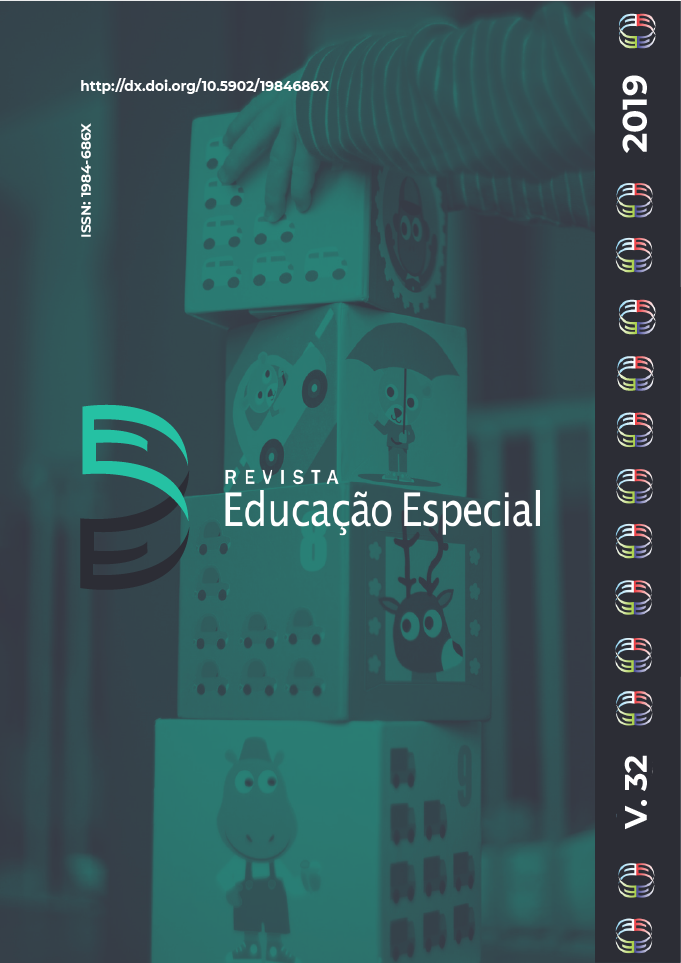Deaf and Hearing: towards Intercultural, Democratic and Plural Education
DOI:
https://doi.org/10.5902/1984686X38705Keywords:
Brazilian educational scenery is configured, in the present days, as a heterogeneous, multilingual and multicultural space. Then, education of deaf people is presented as defiance for researchers, deaf people and their families, once because even with advAbstract
Brazilian educational scenery is configured, in the present days, as a heterogeneous, multilingual and multicultural space. Then, education of deaf people is presented as defiance for researchers, deaf people and their families, once because even with advances in teaching and learning area, the universe of deaf is not contemplated integrally by several reasons. Therefore, the research work here proposed defined as aim at analyze and reflect on the education available for deaf people as a way to provide a debate about the methodologies and cultural artifacts which has been used for deaf people have, in the Brazilian context, ensured their right to a democratic and plural education. The methodology used in this research was in the qualitative and bibliographic approach, and search, through the analysis, understand whether the artifacts play appropriately their role, in other words, if they ensure a plural and democratic education. As cultural artifacts we understand political, linguistic, artistic and literary expressions of deaf community. In this perspective, the hypothesis here suggested is that only by an intercultural education, connected with cultural artifacts of deaf culture will be possible ensure a democratic and plural education.Downloads
References
BRASIL. Decreto nº 5.626, de 22/12/2005. Regulamenta a Lei no 10.436, de 24 de abril de 2002, que dispõe sobre a Língua Brasileira de Sinais - Libras, e o art. 18 da Lei no 10.098, de 19 de dezembro de 2000.
¬¬¬________. Lei nº 10.436, de 24/04/2002. Dispõe sobre a Língua Brasileira de Sinais - Libras e dá outras providências.
BOURDIEU, Pierre. Escritos de educação. São Paulo: Vozes, 2014.
_________. O Poder simbólico. Rio de Janeiro: Bertrand Brasil, 2012.
CANDAU, Vera. Maria. Multiculturalismo e educação: desafios para a prática pedagógica. In: MOREIRA, Antonio. Flávio; CANDAU, Vera. Maria. Multiculturalismo: diferenças culturais e práticas pedagógicas. Petrópolis: Vozes, 2013.
CANDAU, Vera. Maria. Conversas com...sobre a didática e a perspectiva multi/intercultural. Campinas: Educação e Sociedade. vol. 27, nº 95, p. 471-493. 20068 (online)
DORZIAT, Ana; O outro da educação: pensando a surdez com base nos temas Identidade/Diferença, Currículo e Inclusão. Petrópolis, RJ: Vozes, 2009.
FIGUEIRA, Alexandre. Dos Santos. Material de apoio para o aprendizado de Libras. São Paulo: Phorte, 2011.
KARNOPP, Lodenir. Becker. – Literatura Surda. ETD – Educação Temática Digital, Campinas, v.7, n.2, p.98-109, jun. 2008.
_________. O ensino da Língua Portuguesa para surdos numa perspectiva bilíngue. In. Fórum de Pesquisa Científica e tecnológica. Canoas: 2001
LOPES, Maura. Corcini. Relações de poderes no espaço multicultural da escola de surdos In: SKLIAR, Carlos. (Org.). A surdez: um olhar sobre as diferenças. Porto Alegre: Mediação, 2005.
LULKIN, Sérgio. Andrés. O discurso moderno na educação dos surdos: práticas de controle do corpo e a expressão cultural amordaçada. In: SKLIAR, Carlos. (Org.). A surdez: um olhar sobre as diferenças. Porto Alegre: Mediação, 2005.
MAINIEIRI, Cláudia Maria Padilha. Desenvolvimento e aprendizagem de alunos surdos: cognitivo, afetivo e social. Curitiba: IESDE Brasil S.A., 2011.
MIRANDA, Wilson. Comunidades Surdas: olhares sobre os contatos culturais. Dissertações em Educação, 2001 (Mestrado em Educação) – Universidade Federal do Rio grande do Sul, Porto Alegre, 2001.
MOURA, Margarida Seabra de. Revisando conceitos: o necessário exercício da construção da identidade a partir da diferença. In. MANTOAN, Maria Teresa Eglér (Org.). O desafio das diferenças nas Escolas. Petrópolis- RJ: Vozes, 2011.
OLIVEIRA, Liliane Assumpção. Fundamentos Históricos, Biológicos e Legais da Surdez. Curitiba: IESD Brasil S.A., 2011.
PERLIN, Gladis. Identidades surdas. In: SKLIAR, Carlos. (Org.). A surdez: um olhar sobre as diferenças. Porto Alegre: Mediação, 2005.
PERLIN, Gladis. e STOEBEL, Karin. Fundamentos da Educação de Surdos. Florianópolis: Editora da UFSC, 2008
REALE, Giovane. História da Filosofia. São Paulo: Paulus, 2006.
STROBEL, Karin. As imagens do outro sobre a cultura surda. Florianópolis: Ed. da UFSC, 2015.
¬¬¬¬¬
________, História da Educação de Surdos. Florianópolis: UFSC, 2009.
________, Surdos: vestígios culturais não registrados na história. Florianópolis: UFSC, 2008.
WEBER, Max. Ciência e Política. Duas vocações. São Paulo: Cultrix, 1967.
Published
How to Cite
Issue
Section
License
Declaration of originality
We declare that all articles present in the journal Revista Educação Especial (UFSM) are originals and were not submitted for publishing on any other publication, as a whole or a fraction. We also declare that, after being published by Revista Educação Especial (UFSM), a paper will not be submitted to another journal within two years. After this time, our journal transfers the publishing rights to the authors, with a permit granted by the Editorial Council.
We also acknowledge that the originals’ submission to Revista Educação Especial (UFSM) implies on a transference of copyright for physical and digital publishing to the journal. In case of noncompliance, the violator will receive sanctions and penalties predicted by the Brazilian Copyright Protection Law (n. 9610, dated 19/02/98).







